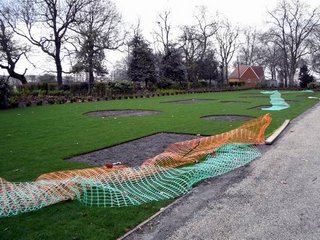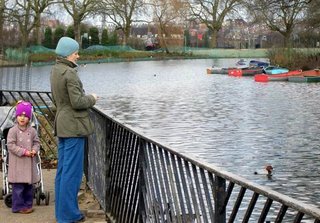 (Photo from www.zeigermann.com)
(Photo from www.zeigermann.com)This is a rather small post, for it is just a few scribbles of thoughts. Panda's comment in Stonehenge post about Rapa Nui reminded me about the downfall of the civilisation on the island, and the destruction of the Easter Island.
From the original lush green vegetation to the dry empty land, how could this happen? I am sure that the people are aware the depletion of the resources as the activities of deforestation goes on. I have heard before that the island is so small that one could stand on top of the mountain and see every corner of the island. But why have they not done anything to preserve the rescources before none was left?
As the resources continued to diminish, the dominoes effect comes in. The Islanders are trapped in a self-inflicted environmental collapse. With no trees, no boats can be built, hence they were cut off from the outside world. No more erection of the moai, hence the collapse of the belief systems, then social organisation. Then the meaningless destruction of the ahu among opposite clans, then war, then...
This looks familiar! Well, we do see them even in today's world! Look at how human consume the resources in the world, and we will know Easter Island has just provided a model of what-could-have-been. The set-up of the model is strikingly similar to the world we live in now - limited resources, unlimited wants. Throughout the years of human history, people have found ways and means to extract resrouces to sustain population growth. Yet, have we devised a system that actually conserve the environment and preserve the resources? Have we found a way of living that does not irreversibly damage our life support system?
In the Easter Island history, we saw the ugly nature of human of fighting for survival, and a scarier thought is that human has not even remorsed even until the final fatal end of the civilisation. If this is how human act, this would be a very scary reflection on today's society. In every aspect of our life, have we gone too beyond the turning point? Do we still carry out acts of destruction though we are well aware of the consequences? Do we ignore the warning signs and hope silently that the comeuppance will not fall on us, but on OTHER people?
Unfortunately, in most of the times, we do. And I am not speaking onlt in environmental terms. Major decisions in all fields - politics, economics, society, humanity... Have we not come upon some hauntingly familiar scenarios? Do we learn? Do we take different action?
Let's pray for a better tomorrow.
... ... ... ...
Okay, I should stop rambling before I go into a rattling mode.
Quote of the day:
"If we forgive God for his crime against us, which is to have made us finite creatures, he will forgive our crime against him, which is that we are finite creatures." - Simone Weil (1909-1943), French philosopher.
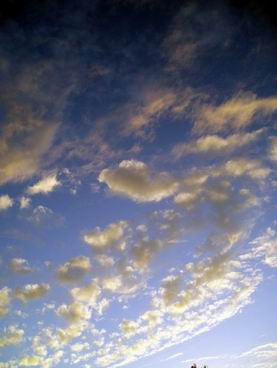
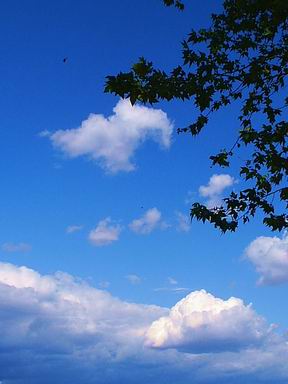
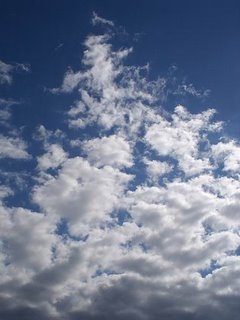





 (To get the weir into the pic, I had to extend my already-freezing hand over the edge of the bridge walls, nearly dropped the poor camera...)
(To get the weir into the pic, I had to extend my already-freezing hand over the edge of the bridge walls, nearly dropped the poor camera...)






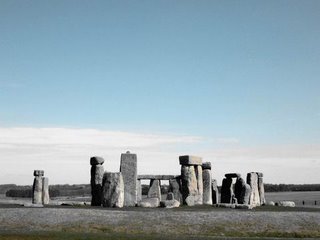 The sunshine was so good! So I am quite happy with the photographs we've taken. Here it is - the famous stones!
The sunshine was so good! So I am quite happy with the photographs we've taken. Here it is - the famous stones!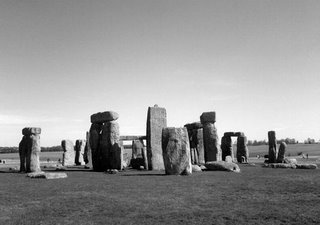
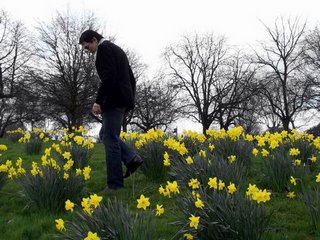 (Gotta apologize to kk for putting him on the album cover without permission)
(Gotta apologize to kk for putting him on the album cover without permission)